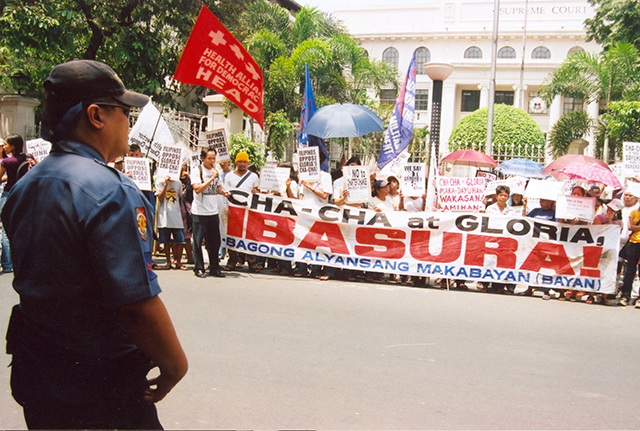Federal Charter Railroaded: Media Missed House Vote Anomalies

AFTER THREE failed attempts at charter change during her own presidency, House Speaker Gloria Macapagal Arroyo may finally get her
In either print or broadcast, media reportage of the historic vote was surprisingly inadequate. The resolution’s second reading passage on December 3 should have driven media to pay closer attention. But few reports pointed out that the House plenary debates were cut short, excluding further arguments. Most media failed to ask why the resolution passed its second reading despite the lack of quorum.
Media coverage did not provide the required context, failing to recall that Arroyo had announced in August that Congress did not have enough time to discuss charter change; that would not be able to pass the legislation with elections coming up in 2019. Routine reports noted Arroyo’s submission of RBH 15 in September. Obviously, Arroyo had not given up on the idea of charter change in the current l
Perhaps media’s lack of interest in the resolution can be explained by the belief that the Senate would not pursue charter change at this time. So other important developments were prioritized by the media: the “insertions” in the proposed 2019 budget; and Senator Ramon “Bong” Revilla’s acquittal of plunder charges during the period CMFR monitored from December 4 to 11, 2018.
But the discussion of RBH 15 deserved media focus. The resolution is controversial and its flaws have been pointed out even by supporters of federalism. Coverage should have reflected more effort on the part of the press to help the public understand who would stand to benefit from the hurried passage of RBH 15 by the House.
CMFR monitored the reporting of three broadsheets (Philippine Daily Inquirer, Philippine Star, Manila Bulletin), four primetime newscasts (ABS-CBN 2’s TV Patrol, GMA-7’s 24 Oras, TV5’s Aksyon and CNN Philippines’ News Night), and selected online news sites.
Rushed Agenda
News accounts focused on reporting the legislative proceedings, noting dissenting views against the resolution. Most reports did not call attention to the anomalies in the rush of the House to vote.
CMFR cheers the notable exceptions that did.
Rappler pointed out that the interpellation period for the resolution was limited to only three session days—November 21, 26 and 27. Deputy Speaker Raneo Abu who was presiding over the session deliberately ignored Rep. Antonio Tinio (ACT Teachers Party-list) who was asking to be recognized. The session was closed before he and other members had a chance to interpellate.
TVPatrol’s quoted Rep. Carlos Zarate (Bayan Muna party-list) who questioned the resolution’s passage in the second reading even though there were less than fifty members present during the session. According to the Rules of the House, the presence of the majority of all 297 members is required for it to conduct official business. The vote ignored this rule.
Public affairs shows were able to draw attention to some points that most reports glossed over. Some explainers highlighted some provisions in the House draft charter.
In ANC’s Headstart, Rep. Lito Atienza (Buhay Party-list), a known ally of Arroyo and an advocate of federalism, said the resolution had been passed as if it were just a run-of-the-mill ordinance. In another Headstart interview, Conrado “Ding” Generoso, constitutional commission spokesperson, said that it reflected the lawmaker’s self-serving interest in clinging to power, referring to the House charter’s provisions to remove the term limits for lawmakers and lift the ban on political dynasties.
InterAksyon compared the Con-Com and the House’s versions of the draft federal charter. Apart from lifting the ban on dynasties and term limits, the parameters for foreign ownership of companies had also been removed. The Philippine Star pointed out that the House’s charter does not automatically create federal states, unlike the charter drafted by the Con-Com. In TV5’s Aksyon, reporter Ed Lingao discussed other problematic provisions of the House charter, among them the House Speaker’s chairmanship of the Commission on Appointments.
The shift to federalism is one of the president’s campaign promises and legislative priorities. It is no surprise that Arroyo, who is an advocate of charter change herself, will do everything in her power to ensure its realization. But why the rush, given the fundamental change that this involves in the way government works and the way power is shared. The public deserves to know what charter change holds for them. Among many issues, its economic viability should be examined. The House however spent no more than three days of plenary debate before moving the resolution forward. Reducing this to routine reporting is a failure of media responsibility.
Leave a Reply